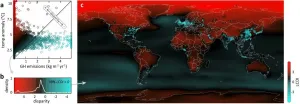University of Pittsburgh School of Medicine and University of Wisconsin-Madison scientists report today in Science Translational Medicine that combining targeted radiopharmaceutical therapy with immunotherapy significantly boosts eradication of metastatic cancer in mice, even when the radiation is given in doses too low to destroy the cancer outright.
"We're excited--with such low doses of radiation, we didn't expect the response to be so positive," said lead author Ravi Patel, M.D., assistant professor at Pitt and radiation oncologist at UPMC Hillman Cancer Center. "In clinical trials, we tend to go with the maximum tolerable dose, the idea being that radiation kills the cancer and the more we give, the better. But in this study our concept is different--we're not trying to destroy the tumor with radiation. We're trying to trigger the immune system to kill the cancer."
Immunotherapy has revolutionized cancer treatment by helping patients' immune systems fight off cancer. But some patients develop resistance to current immunotherapies and others have cancers characterized by immunologically "cold" tumors, which evade or suppress the patient's immune response against his or her cancer.
In these cases, oncologists have found that external beam radiotherapy (EBRT)--where a patient is placed in a carefully calibrated machine that aims a beam of radiation directly at their tumor--can help turn "cold" or resistant tumors into "hot" tumors in which the immunotherapy treatments work better.
EBRT cannot typically be delivered to all tumor sites in patients whose cancer has metastasized--or spread to other parts of their body--because distant tumors can be too small, plentiful and diffuse for the patient to tolerate so much radiation. In those cases, targeted radionuclide therapy can be an option. This treatment approach uses a radioactive element that is linked with a cancer-targeting molecule and given through an intravenous infusion, delivering radiation directly to the cancer cells.
Patel and senior author Zachary Morris, M.D., Ph.D., associate professor of human oncology in the University of Wisconsin School of Medicine and Public Health, and their colleagues designed a study to give mice with immunologically cold metastatic cancers varying doses of targeted radionuclide therapy alongside immunotherapy.
"Because radiation from a targeted radionuclide therapy, if given at too high of a dose or at the wrong time, could kill or damage the tumor-infiltrating immune cells that we ultimately want to destroy these tumors, it was critical to design these studies with a precise understanding of the radiotherapy dose and the time over which this would be emitted in the tumor," Morris said.
For this, Patel and Morris worked closely with a team of medical physicists led by Bryan Bednarz, Ph.D., professor of medical physics in the University of Wisconsin-Madison. By obtaining serial images of the radiation emitted by a targeted radionuclide therapy, this group was able to determine how much and when radiation would be delivered to a tumor and to other normal tissues.
To their surprise, the mice given doses much too low to kill the cancer when given alone were the ones that were cured of these cancers when given together with immunotherapy.
Instead of destroying the tumors, Patel said, the low-dose radiation was "stressing cells in the tumor," stimulating the kind of response that the immune system typically produces to an infection. Boosted by the immunotherapy, the immune cells attacked the cancer cells that had been damaged by the radiotherapy.
Additionally, when tumor cells were reintroduced to the mice cured by the combination therapy, they quickly fought them off and did not develop cancer again.
"Treating with low-dose radiotherapy and immunotherapy eradicated their cancer, and it also acted as a sort of anti-cancer vaccine, preventing the mice from getting this type of cancer again," Patel said.
In addition to the mouse studies, the physician-scientists worked together with David Vail, D.V.M., at the University of Wisconsin School of Veterinary Medicine, and tried the combination of targeted radionuclide therapy and immunotherapy as a treatment in pet dogs who had naturally occurring metastatic cancer. The dogs tolerated this treatment combination well, without toxic side effects.
In both animal studies, the researchers used a novel agent that can target nearly any type of cancer, including tumors at any location within the body. This agent was developed by one of the co-authors, Jamey Weichert, Ph.D., professor of radiology at the University of Wisconsin School of Medicine and Public Health, in collaboration with co-author Reinier Hernandez, Ph.D., assistant professor of medical physics at the University of Wisconsin-Madison. A Madison-based start-up company, Archeus Technologies, is now completing studies needed to apply for approval from the U.S. Food & Drug Administration to begin testing this agent in human clinical trials.
"Human clinical trials are needed in order to develop our finding into a new standard of care," said Patel. "In the meantime, the concept of this approach can be tested in humans now, using approved radiotherapies designed to target specific types of cancer."
INFORMATION:
Additional authors on this research are Peter Carlson, Joseph Grudinski, Ph.D., Amber M. Bates, Ph.D., Justin C. Jagodinsky, Amy Erbe, Ph.D., Ian R. Marsh, M.S., Ian Arthur, Eduardo Aluicio-Sarduy, Ph.D., Raghavan Sriramaneni, Ph.D., Won Jong Jin, Ph.D., Christopher Massey, Alexander L. Rakhmilevich, M.D., Ph.D., Jonathan W. Engle, Ph.D., Trang Le, D.O., KyungMann Kim, Ph.D., and Paul M. Sondel, M.D., Ph.D., all of the University of Wisconsin-Madison.
This research was supported by National Institutes of Health grants K08CA241319-01, 1DP5OD024576-01, U01CA233102, R35CA197078, U54CA232568, TL1TR002375, F30CA250263, T32CA009206, P01CA250972, U54 HD090256 and T32 GM008692.
To read this release online or share it, visit http://www.upmc.com/media/news/071421-Patel-TRTICI-Science [when embargo lifts].
About the University of Pittsburgh School of Medicine
As one of the nation's leading academic centers for biomedical research, the University of Pittsburgh School of Medicine integrates advanced technology with basic science across a broad range of disciplines in a continuous quest to harness the power of new knowledge and improve the human condition. Driven mainly by the School of Medicine and its affiliates, Pitt has ranked among the top 10 recipients of funding from the National Institutes of Health since 1998. In rankings recently released by the National Science Foundation, Pitt ranked fifth among all American universities in total federal science and engineering research and development support.
Likewise, the School of Medicine is equally committed to advancing the quality and strength of its medical and graduate education programs, for which it is recognized as an innovative leader, and to training highly skilled, compassionate clinicians and creative scientists well-equipped to engage in world-class research. The School of Medicine is the academic partner of UPMC, which has collaborated with the University to raise the standard of medical excellence in Pittsburgh and to position health care as a driving force behind the region's economy. For more information about the School of Medicine, see http://www.medschool.pitt.edu.
http://www.upmc.com/media
Contact: Allison Hydzik
Office: 412-647-9975
Mobile: 412-559-2431
E-mail: HydzikAM@upmc.edu
Contact: Cyndy Patton
Mobile: 412-415-6085
E-mail: PattonC4@upmc.edu





